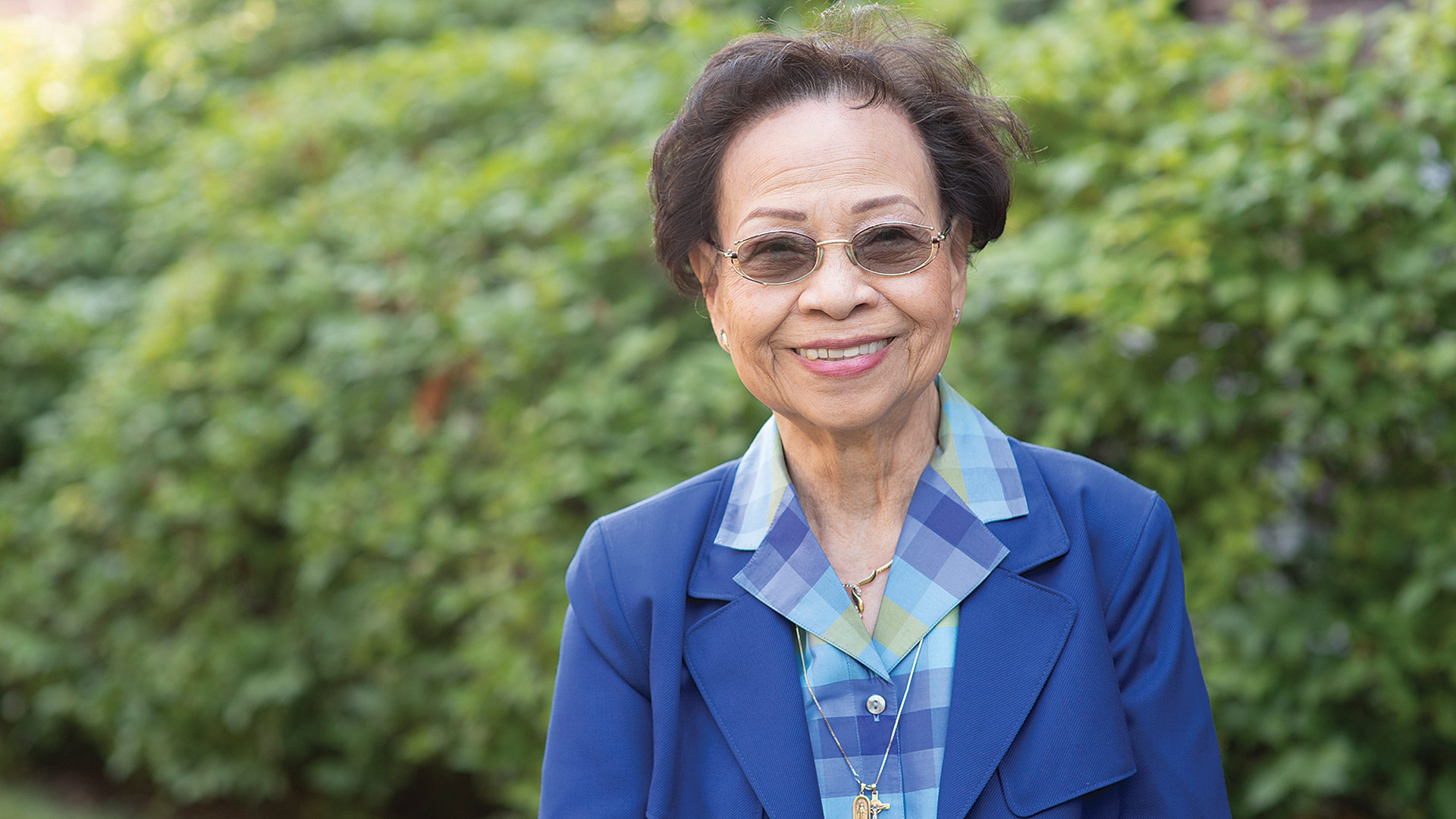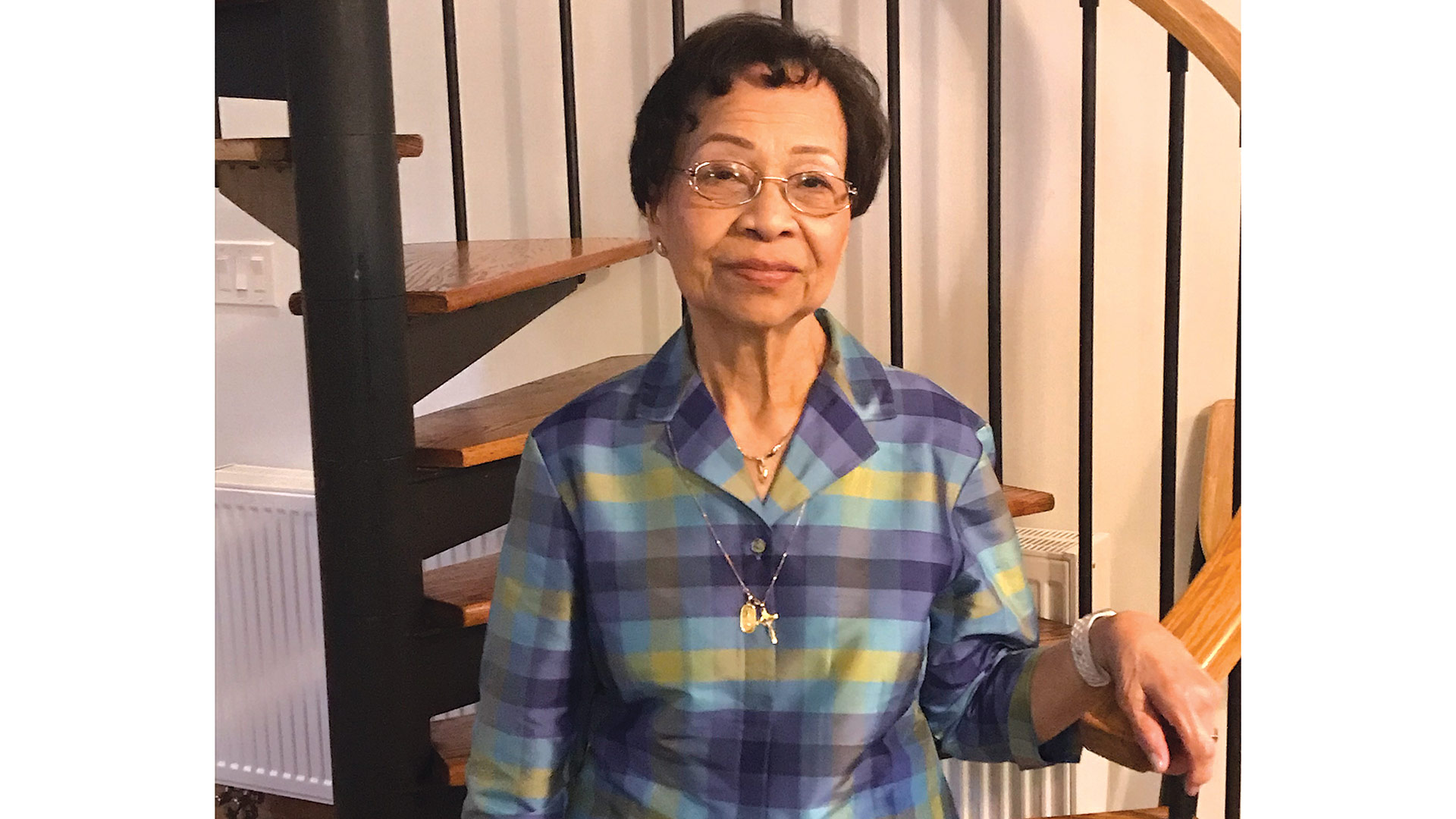Alicia Ross
Health/Wellness Administrator
Medical Director, Holyoke VNA Hospice Life Care

Alicia Ross
This Administrator Has Been a Pioneer, a Mentor, and an Inspiration
By Mark Morris
Growing up in the Philippines, Alicia Ross always hoped to become a doctor. Her father, a dentist, had other plans and wanted his daughter to take over his practice.
“I didn’t want to go into dentistry, so I went into medicine,” Ross recalled. Shortly after graduating from Manila Central University and passing her medical boards, she emigrated to the U.S.
In 1971, Ross joined the staff of Holyoke Medical Center, specializing in hematology and oncology. At the time, she worked with cancer patients, with the single goal of healing them. But for patients with advanced cancers, doctors can often reach a point where there are no more treatment options. Ross understood those patients needed something else.
“It’s huge for the patient to be reassured they’ve done all they can do to fight their illness. It’s also just as important for family members because they will remember this for the rest of their lives.”
“We had to refocus our goal,” she said. “For those cases, instead of a cure, we would instead work toward comfort measures for the end of life and do our best to ease their pain.”
So began what could be called a new career for Ross, or at least a new, exhilarating, and rewarding chapter in a remarkable — and ongoing — career. In 1991, she would become the founding medical director of Holyoke VNA Hospice Life Care.
Over the past 30 years, she has changed countless lives, and not just those who come under her care. Indeed, as an administrator, she has been a leader, a mentor, and an inspiration to those she has worked with, primarily by challenging them to continuously find ways to bring comfort and, yes, quality of life to those in hospice care.
“Someone referred to Dr. Ross as a ‘pioneer,’ and I think that is a very apt term for her,” said Maureen Groden, director of Hospice and Palliative Care, adding that Ross has changed the way many think when they hear that word ‘hospice,’ and she has spent her career educating and innovating.

Alicia Ross says many people recoil at the idea of hospice without realizing what a benefit it can be.
Jennifer Martin, director of Operations and IT for Holyoke VNA Hospice Life Care, agreed.
“As medical director, Dr. Ross has always been our go-to; she is the backbone of the hospice program,” she said. “In our weekly team meetings, she goes above and beyond to make sure we provide the absolute best care for every patient and every situation.”
Those sentiments certainly help explain why Ross has been named a Healthcare Hero for 2021 in the always-competitive Administration category. Over the years, that honor has gone to those who don’t simply manage, but lead; those who not only care for those in need, but inspire others to reach higher and find ways to continually improve that care.
Ross certainly continues that tradition.
Life-changing Decisions
Getting back to that word ‘pioneer,’ it is used to describe those who break new ground and blaze a trail for those who would follow.
As Groden said, that term suits Ross because of the way she studied hospice care and adopted best practices, but also because she sought to keep raising the bar in all aspects of this field of healthcare.
Turning back the clock to the late ’80s, Ross said she traveled to England to study under Dr. Cicely Saunders, considered the founder of the modern hospice movement.
“Before we started our hospice services in Holyoke, I went to England to better understand how they did it,” she told BusinessWest. While she worked primarily with the doctor’s staff, Ross also met with and learned from Saunders herself.
Ross turned her knowledge into action in 1990, joining others in creating Holyoke VNA Hospice Life Care. They did so, she said, with a simple philosophy: that “dying is a part of living.”
With hospice care, it’s possible to bring dignity and acceptance to patients and families when they are making difficult decisions about end-of-life care. But it is never an easy conversation.
“We still see patients who have a strong negative reaction to the word ‘hospice,’” Ross said, adding that this is unfortunate because people who could benefit from hospice care are not always referred early enough to enable them to gain some benefit from it.
“In addition to nurses who provide pain relief, hospice also offers other services to make a person’s last days more comfortable,” she noted. “Home health aides, chaplains, social workers, even volunteers can all bring comfort to the patient.”
No matter what faith a person follows, she added, the chaplain’s role is part of providing comfort and pain relief. “During this time, many patients have emotional and spiritual pain. When the chaplain can reduce some of that emotional pain, it also eases some of the physical pain.”
Volunteers also play an important role. While COVID restrictions have curtailed in-person visits to patients, volunteers also make an important contribution in providing comfort.
“We try to match volunteers to the patient,” Ross said. “For example, if the patient is a veteran, our volunteer is a veteran.” By aligning interests, the volunteer becomes a welcome face and often develops a friendship with the patient.
Administering medicine is an important part of hospice, but there are often non-medical ways to ease a patient’s pain. Ross gave an example of how a patient with lung disease will regularly experience shortness of breath.
“While morphine is a good treatment, oxygen is too, so a fan blowing in the room can be very effective,” she said, adding that anxiety also contributes to difficulty in breathing. “Many patients feel they are burdening their family, so we work on lessening their stress and anxiety to help them understand they are not a burden on their family.”
According to Groden, family members often struggle and wonder if they’ve done the right thing in referring a loved one to hospice. She said Ross approaches that conversation by reassuring the family that, at this point in time, additional treatments would actually cause more harm than good, and that hospice is the most compassionate approach.
“It’s huge for the patient to be reassured they’ve done all they can do to fight their illness,” Groden said. “It’s also just as important for family members because they will remember this for the rest of their lives.”
While modern medicine can extend people’s lives, many still need hospice in their later years. Ross also pointed out that hospice is not just for the elderly. “We have a lot of illnesses that can affect relatively younger people, like Lou Gehrig’s disease, early-onset dementia, and, of course, cancer, which affects people at all ages.”
No matter the age, she noted, the goal of Hospice Life Care remains the same. “Our main purpose is to give patients comfort through the end of life, to make them as comfortable as possible, and treat their symptoms so they don’t suffer.”
After 50 years at Holyoke Medical Center, 30 of which were at Hospice Life Care, Ross has certainly seen many changes in healthcare. She listed electronic medical records and advancements in medication as two of the most significant.
While many physicians choose to retire rather than confront new technology, she took time to learn electronic medical records and embraced the advances in both technology and medicine. Her colleagues say she never misses a beat, one of the reasons she’s an effective leader and healthcare provider.
At the urging of her husband, Ross had planned to retire by 2015. But when he became ill in 2014 and passed away quickly, she decided to continue her work.
“I thought if I retired, I would only sit around the house and mourn, so a better choice was to keep working,” she said, adding that, with each life she impacts, she embraces that decision.
A True Leader
Martin observed that Holyoke VNA Hospice Life Care admits approximately 275 patients to hospice each year.
“When you multiply that number times 30 years, it gives you an idea of just how many lives Dr. Ross has touched,” she said, adding that her lasting impact is measured not in numbers, but in words, especially those used by family members of patients to describe the compassionate care they received.
Those words convey many things, including just how much of a pioneer she has been throughout her career, and how she has convinced so many that dying really is a part of living.
Mostly, though, they convey that she is a true Healthcare Hero.





